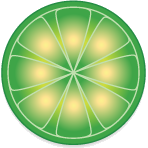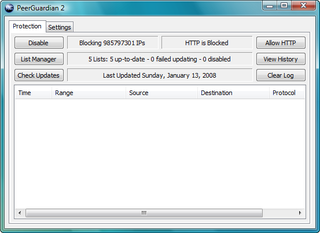Related Research Articles

LimeWire was a free peer-to-peer file sharing client for Windows, macOS, Linux and Solaris. Created by Mark Gorton in 2000, it was most prominently a tool used for the download and distribution of pirated materials, particularly pirated music. In 2007, LimeWire was estimated to be installed on over one-third of all computers globally.

Warez is a common computing and broader cultural term referring to pirated software that is distributed via the Internet. Warez is used most commonly as a noun, a plural form of ware, and is intended to be pronounced like the word wares. The circumvention of copy protection (cracking) is an essential step in generating warez, and based on this common mechanism, the software-focused definition has been extended to include other copyright-protected materials, including movies and games. The global array of warez groups has been referred to as "The Scene", deriving from its earlier description as "the warez scene". Distribution and trade of copyrighted works without payment of fees or royalties generally violates national and international copyright laws and agreements. The term warez covers supported as well as unsupported (abandonware) items, and legal prohibitions governing creation and distribution of warez cover both profit-driven and "enthusiast" generators and distributors of such items.
BitTorrent, also referred to as simply torrent, is a communication protocol for peer-to-peer file sharing (P2P), which enables users to distribute data and electronic files over the Internet in a decentralized manner. The protocol is developed and maintained by Rainberry, Inc., and was first released in 2001.

PeerGuardian is a free and open source program developed by Phoenix Labs (software). It is capable of blocking incoming and outgoing connections based on IP blacklists. The aim of its use was to block peers on the same torrent download from any visibility of your own peer connection using IP lists. The system is also capable of blocking custom ranges, depending upon user preferences.

The Pirate Bay is an online index of digital content of entertainment media and software. Founded in 2003 by Swedish think tank Piratbyrån, The Pirate Bay allows visitors to search, download, and contribute magnet links and torrent files, which facilitate peer-to-peer file sharing among users of the BitTorrent protocol.
This is a timeline of events in the history of networked file sharing.

Peer-to-peer file sharing is the distribution and sharing of digital media using peer-to-peer (P2P) networking technology. P2P file sharing allows users to access media files such as books, music, movies, and games using a P2P software program that searches for other connected computers on a P2P network to locate the desired content. The nodes (peers) of such networks are end-user computers and distribution servers.
File sharing in Canada relates to the distribution of digital media in that country. Canada had the greatest number of file sharers by percentage of population in the world according to a 2004 report by the OECD. In 2009 however it was found that Canada had only the tenth greatest number of copyright infringements in the world according to a report by BayTSP, a U.S. anti-piracy company.

isoHunt was an online torrent files index and repository, where visitors could browse, search, download or upload torrents of various digital content of mostly entertainment nature. The website was taken down in October 2013 as a result of a legal action from the MPAA; by the end of October 2013 however, two sites with content presumably mirrored from isohunt.com were reported in media. One of them – isohunt.to – became a de facto replacement of the original site. It is not associated in any way with the old staff or owners of the site, and is to be understood as a separate continuation.
Arts and media industry trade groups, such as the International Federation of the Phonographic Industry (IFPI) and Motion Picture Association of America (MPAA), strongly oppose and attempt to prevent copyright infringement through file sharing. The organizations particularly target the distribution of files via the Internet using peer-to-peer software. Efforts by trade groups to curb such infringement have been unsuccessful with chronic, widespread and rampant infringement continuing largely unabated.
Randy Saaf is the CEO of Lucid Sight, a game studio that has released several VR titles for the PlayStation, Gear, and Google Daydream. Saaf co-founded OnSystems in 2000 which specialized in encrypted P2P messaging and file transfer. Saaf was the chief executive officer, and founder, of MediaDefender, Inc., which was purchased by ARTISTdirect, Inc. in 2005 for $42.5 million in cash. Saaf co-founded Jirbo, a large developer of iPhone games, in 2008. Jirbo rebranded itself to AdColony and was sold to Opera Software for $350 million. Saaf co-founded AlphaGenius. AlphaGenius is an investment and technology development firm that farms social media data and produces trading models for the hedge fund industry.

The use of the BitTorrent protocol for the unauthorized sharing of copyrighted content generated a variety of novel legal issues. While the technology and related platforms are legal in many jurisdictions, law enforcement and prosecutorial agencies are attempting to address this avenue of copyright infringement. Notably, the use of BitTorrent in connection with copyrighted material may make the issuers of the BitTorrent file, link or metadata liable as an infringing party under some copyright laws. Similarly, the use of BitTorrent to procure illegal materials could potentially create liability for end users as an accomplice.

TorrentFreak (TF) is a blog dedicated to reporting the latest news and trends on the BitTorrent protocol and file sharing, as well as on copyright infringement and digital rights.

Copyright infringement is the use of works protected by copyright without permission for a usage where such permission is required, thereby infringing certain exclusive rights granted to the copyright holder, such as the right to reproduce, distribute, display or perform the protected work, or to make derivative works. The copyright holder is typically the work's creator, or a publisher or other business to whom copyright has been assigned. Copyright holders routinely invoke legal and technological measures to prevent and penalize copyright infringement.
ACS:Law was a United Kingdom law firm specialising in intellectual property law. Prior to 2009, its most notable case was the defence of a British national accused of public indecency in Dubai. The firm is best known for its actions against persons allegedly infringing copyright through peer-to-peer file sharing. The firm ceased pursuing file sharers in January 2011 and ceased trading on 3 February 2011.
File sharing in the United Kingdom relates to the distribution of digital media in that country. In 2010, there were over 18.3 million households connected to the Internet in the United Kingdom, with 63% of these having a broadband connection. There are also many public Internet access points such as public libraries and Internet cafes.

Operation Payback was a coordinated, decentralized group of attacks on high-profile opponents of Internet piracy by Internet activists using the "Anonymous" moniker. Operation Payback started as retaliation to distributed denial of service (DDoS) attacks on torrent sites; piracy proponents then decided to launch DDoS attacks on piracy opponents. The initial reaction snowballed into a wave of attacks on major pro-copyright and anti-piracy organizations, law firms, and individuals. The Motion Picture Association of America, the Pirate Party UK and United States Pirate Party criticised the attacks.
Torrent poisoning is intentionally sharing corrupt data or data with misleading file names using the BitTorrent protocol. This practice of uploading fake torrents is sometimes carried out by anti-infringement organisations as an attempt to prevent the peer-to-peer (P2P) sharing of copyrighted content, and to gather the IP addresses of downloaders.
Copyright Alert System (CAS) was a voluntary industry effort to educate and penalize internet users who engage in the unauthorized and unlawful distribution of copyrighted works via peer-to-peer file sharing services. The program was operated by the Center for Copyright Information, a consortium consisting of the Recording Industry Association of America (RIAA), the Motion Picture Association of America (MPAA), and the internet service providers AT&T, Cablevision, Comcast, Time Warner Cable, and Verizon.
Maverickeye UG is a copyright enforcement company that is based in Germany. It detects and retraces copyright infringement using software technology.
References
- ↑ "Showdown Looms over Pirated-Media Directory". Wall Street Journal. 11 January 2008.
- ↑ Holahan, Catherine (March 5, 2007). "Advertising to the File-Sharing Crowd" BusinessWeek . Retrieved on September 16, 2007.
- 1 2 Anderson, Nate (2007-03-19). "Peer-to-peer poisoners: A tour of MediaDefender". Ars Technica. Retrieved 16 September 2007.
- ↑ Angwin, Julia; McBride, Sarah; Smith, Ethan (18 October 2006). "Record Labels Turn Piracy Into a Marketing Opportunity". The Wall Street Journal . Retrieved 16 September 2007.
- ↑ Paul, Ryan (30 May 2008). "Revision3 CEO: Blackout caused by MediaDefender attack". arstechnica.com. Retrieved 2008-05-30.
- 1 2 Van der Sar, Ernesto (4 July 2007). "Anti-Piracy Gang Launches their own Video Download Site to Trap People". TorrentFreak. Retrieved 17 September 2007.
- ↑ "MPAA Dummy Site Snares Pirates" Archived 2007-09-27 at the Wayback Machine DigitalTrends.com[ dead link ]
- ↑ "Domain Registration Information"
- ↑ "Miivi.com goes down"
- 1 2 3 Cheng, Jacqui (2007-07-06). "MediaDefender denies entrapment accusations with fake torrent site". Ars Technica. Retrieved 16 September 2007.
- ↑ McBride, Sarah (September 17, 2007). "Antipiracy group suffers email leak". The Wall Street Journal . Retrieved on September 16, 2007.
- 1 2 Van der Sar, Ernesto (15 September 2007). "The Biggest Ever BitTorrent Leak: MediaDefender Internal Emails Go Public * TorrentFreak" . Retrieved 16 September 2007.
- ↑ Media Defenders Profile - National Business News - Print - Portfolio.com
- ↑ ARTISTDIRECT INC (Form: 10QSB, Received: 11/14/2007 16:07:22) Archived 2007-11-23 at the Wayback Machine
- ↑ Veiga, Alex (September 18, 2007). "Hackers leak anti-piracy firm's e-mails". Associated Press. Retrieved on September 19, 2007.
- ↑ Carr, Jim (September 18, 2007). "Stolen emails reveal anti-copyright infringement company's 'honeypot' strategy Archived 2007-10-16 at the Wayback Machine ". SC Magazine US. Retrieved on September 19, 2007.
- 1 2 Leaked Media Defender e-mails reveal secret government project
- ↑ P2P sites ridicule MediaDefender takedown notices in wake of e-mail leak arstechnica.com
- ↑ Re: MiiVi got Dugg Archived 2007-10-16 at the Wayback Machine
- ↑ Van der Sar, Ernesto (16 September 2007). "MediaDefender Phone Call and Gnutella Tracking Database Leaked". TorrentFreak. Retrieved 2024-02-02.
- ↑ Van der Sar, Ernesto (20 September 2007). "MediaDefender Anti-Piracy Tools Leaked". TorrentFreak. Retrieved 2024-02-02.
- ↑ "MediaDefender source code leaked to wibble". 2007-09-25. Archived from the original on 2007-09-25. Retrieved 2024-02-02.
- ↑ Inside the Attack that Crippled Revision3 Archived 2013-07-21 at the Wayback Machine
- ↑ Anti-piracy misfire blamed for crash of popular online TV network
- ↑ "MediaDefender Defends Revision3 SYN Attack". Wired . 2008-05-31. Archived from the original on 2023-03-27.